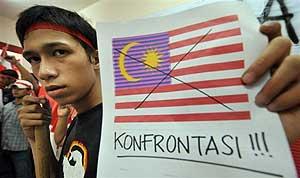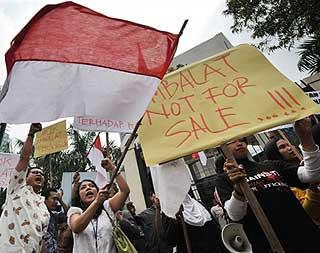Indonesia's often-prickly relations with neighbouring Malaysia are being tested by a fresh dispute over traditional cultural heritage.
A Malaysian tourism commercial aired on Discovery Channel has sparked an uproar in Indonesia because it featured a traditional Balinese dance called ‘Pendet’.
Indonesians vented their anger over the perceived cultural piracy on Internet forums and social networking sites such as Twitter and Facebook, many calling Malaysia a "nation of thieves." A firebrand legislator urged the government to declare war on the neighbouring country.
 Despite sharing ethnic, cultural and religious identities, Indonesia and Malaysia - both predominantly Muslim - have been embroiled in occasional disputes over matters such the treatment of migrant workers, territorial disputes and, more recently, cultural icons.
Despite sharing ethnic, cultural and religious identities, Indonesia and Malaysia - both predominantly Muslim - have been embroiled in occasional disputes over matters such the treatment of migrant workers, territorial disputes and, more recently, cultural icons.
About 2 million Indonesians work in Malaysia, mainly as plantation labourers and domestic maids, and anger has been on the rise over reports of abuse of migrants by their Malaysian employers.
In June, Jakarta stopped sending maids to Malaysia temporarily until the two countries agreed on new measures to provide better protection to the workers.
 The latest controversy is not the first time that Indonesians have been up in arms over the perceived theft of their cultural icons. A similar spat erupted two years ago over the use of the Indonesian folk song ‘Rasa Sayang’ in another Malaysian tourism advertisement.
The latest controversy is not the first time that Indonesians have been up in arms over the perceived theft of their cultural icons. A similar spat erupted two years ago over the use of the Indonesian folk song ‘Rasa Sayang’ in another Malaysian tourism advertisement.
Malaysia has apologised for the use of the Balinese Pendet dance, claiming that the mistake was made by a production house paid by Malaysia's Tourism Ministry to produce the commercial, which has since been withdrawn.
But the apology and explanation failed to mollify Indonesians.
Local media reported that Indonesian hackers defaced several Malaysian websites on Monday in a coordinated attack timed to coincide with Malaysia's independence day. Dozens of students
picketed the Malaysian embassy in Jakarta on Tuesday, pelting it with rotten eggs.
More than meets the eye
Ong Hock Chuan, a Jakarta-based Malaysian public relations consultant, said there was more to the dispute than the issue of cultural heritage.
"Indonesians are frustrated with their government for doing so little to capitalise on their culture, which is varied and rich beyond description, and hence letting great opportunities slip away from their hands," he wrote in his blog.
"What is needed here is for Indonesians and Malaysians to get together to have a reasonable conversation about what can be done about the Malaysian tendency to use what they feel is theirs by right of ancestry, against the Indonesian tendency to carp about their neighbour stealing what they think is theirs," he said.
 Indonesia, despite being the world's largest archipelago nation with stunning beaches, volcanoes and coral reefs, has been struggling to capitalize on its enormous tourism potential.
Indonesia, despite being the world's largest archipelago nation with stunning beaches, volcanoes and coral reefs, has been struggling to capitalize on its enormous tourism potential.
In 2008, Indonesia attracted 6 million foreign tourists, while Malaysia drew 22 million visitors.
The Indonesian government said protests and verbal attacks on Malaysia had become irritants, but insisted relations between the two countries remained strong.
"We are neighbours and problems are to be expected from time to time. We hope this is just a temporary outburst and will not escalate further," Foreign Ministry spokesman Faizasyah said.
"We understand Malaysia is uncomfortable with the disproportionate expressions of anger so there's a need to manage the situation well," he said.
 Wimar Witoelar, a television talk show host and political commentator, said the uproar against Malaysia exposed the feeling of inferiority among Indonesians.
Wimar Witoelar, a television talk show host and political commentator, said the uproar against Malaysia exposed the feeling of inferiority among Indonesians.
"There is no need to belabour the current issues of cultural piracy because culture by definition must be accessible and imitation is often the best compliment," Witoelar wrote in Tuesday's edition of Jakarta Post newspaper.
"People enjoy an enthralling production of the ballet Giselle or the Ramayana dance without disturbance from French or Indian nationalists who claim cultural piracy."
"In Indonesia, the experience of our national history is different. Traumatised by different occupying powers and abused by our own leaders, we have yet to regain our confidence as a people," he said.
- DPA

